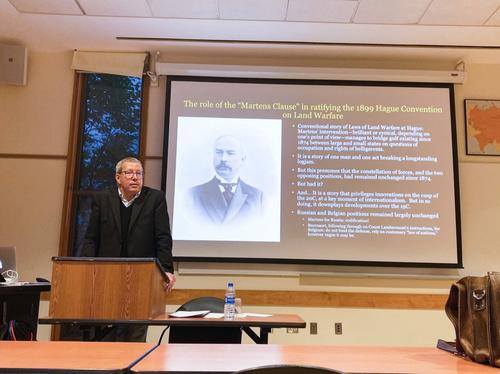
In celebration of Veterans Day and the 101st anniversary of the armistice with Germany that ended World War I, University of Pennsylvania history professor Peter Holquist spoke on Monday afternoon about international law and the 1899 Hague Conference.
Students and professors gathered in Luce Hall to listen to Holquist, who studies modern Europe with a specific emphasis on Russia. Holquist’s talk, titled “The Code of Land Warfare at the 1899 Hague Conference: Russia’s Role and the European Setting,” explained Russia’s role in the emergence of international law. He also emphasized the relevance of international law, not just for geopolitical strategy, but for everyday citizens.
“International conferences do not act as forums for imposing national cultural models, but rather as venues for working through difficult problems and dilemmas,” Holquist said.
Monday’s talk is the second colloquium of the Modern Europe Fall 2019 Series. The series meets once a month during the academic year and was constructed to support a community of scholars in their study of modern European history. Convened by Carolyn J. Dean, a professor of history and French, the colloquium encourages students to examine the relationship between Europe and the rest of the world. The program hosts public lectures, graduate student presentations, small workshop papers and forums.
Holquist’s talk related to his current project, “By Right of War,” which discusses the emergence and codification of international law in Europe in the late 19th and early 20th centuries. The project focuses on imperial Russia’s role in the creation of “laws of war.” Specifically, the work examines the extent to which these laws were obeyed by European militaries.
“By Right of War” examines the intellectual and diplomatic history of Russia in three military conquests: Bulgaria and Anatolia in 1877–78, Manchuria during the Boxer Rebellion in 1900–01 and Galicia and Armenia during World War I.
Holquist said his project seeks to answer “by what means and to what degree can one bring people’s conduct, even in extremis, into line with normative and ethical prescriptions?”
Holquist began his colloquium by noting the importance of cooperation within the international community. Holquist described the timing of the talk as both poignant and appropriate because of his personal connection with Yale.
“I was born in New Haven when my father was a grad student at Yale University, and he taught here for many years,” Holquist said. “This is the first time I’ve presented since he passed away.”
Holquist outlined the events leading up to the Hague Conference, including the 1868 St. Petersburg Declaration, where “laws of humanity” were introduced for the first time. Holquist also discussed the 1874 Brussels Conference, in which members drafted the first major attempt at a declaration on the laws and customs of war.
According to Holquist, the first successful attempt to implement international law came during the 1899 Hague Peace Conference, which introduced the Martens Clause. The Martens Clause “bridged the gulf … between large and small states” and protects people in armed conflict, regardless of whether a specific international law applies to their case.
The event drew nearly 20 attendees, including Cornell Overfield GRD ’20, who attended UPenn during his undergraduate years and took classes taught by Holquist.
“It’s interesting to see how the research has developed in the three years since I last heard about it,” Overfield said.
Margaret Traeger GRD ’21, a graduate student in the history department, also said she enjoyed the colloquium.
She added the event could be especially beneficial for undergraduates.
“It was really compelling … These topics provide a way to develop what we work on in a really narrow instance and reach a broader perspective at the same time,” Traeger said.
This fall semester, participation in the colloquium is a part of the mandatory class for all first-year master’s students in European and Russian Studies, coordinated by E&RS Director of Graduate Studies Bruce Gordon.
Holquist graduated from Columbia University in 1995 with a doctorate with distinction and taught for nine years at Cornell before joining UPenn’s History Department in 2006.
Rebecca Huang | rebecca.huang@yale.edu

